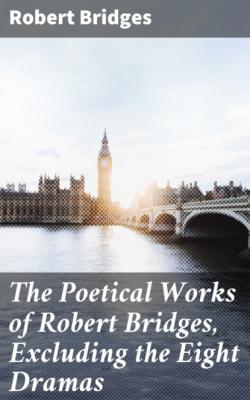The Poetical Works of Robert Bridges, Excluding the Eight Dramas. Bridges Robert
Читать онлайн.| Название | The Poetical Works of Robert Bridges, Excluding the Eight Dramas |
|---|---|
| Автор произведения | Bridges Robert |
| Жанр | Языкознание |
| Серия | |
| Издательство | Языкознание |
| Год выпуска | 0 |
| isbn | 4064066236861 |
Ar. Were they not mortal, sweet, I coud not kill them.
They kill each other in their lust for life; 151
Nay, cruelly persecute their blemisht kin:
And they that thus are exiled from the herd
Slink heart-brok'n to sepulchral solitudes,
Defenceless and dishonour'd; there to fall
Prey to the hungry glutton of the cave,
Or stand in mute pain lingering, till they drop
In their last lair upon the ancestral bones.
Per. What is it that offends me?
Ath. 'Tis Pity, child,
The mortal thought that clouds the brow of man 160
With dark reserve, or poisoning all delite
Drives him upon his knees in tearful prayer
To avert his momentary qualms: till Zeus
At his reiterated plaint grows wrath,
And burdens with fresh curse the curse of care.
And they that haunt with men are apt to take
Infection of his mind: thy mighty mother
Leans to his tenderness.
Per. How should man, dwelling
On earth that is so gay, himself be sad?
Is not earth gay? Look on the sea, the sky, 170
The flowers!
Ath. 'Tis sad to him because 'tis gay.—
For whether he consider how the flowers,
—Thy miracles of beauty above praise—
Are wither'd in the moment of their glory,
So that of all the mounting summer's wealth
The show is chang'd each day, and each day dies,{57}
Of no more count in Nature's estimate
Than crowded bubbles of the fighting foam:
Or whether 'tis the sea, whose azure waves
Play'd in the same infinity of motion 180
Ages ere he beheld it, and will play
For ages after him;—alike 'tis sad
To read how beauty dies and he must die.
Per. Were I a man, I would not worship thee,
Thou cold essential wisdom. If, as thou say'st,
Thought makes men sorrowful, why help his thought
To quench enjoyment, who might else as I
Revel among bright things, and feast his sense
With beauty well-discern'd? Nay, why came ye
To share my pastime? Ye love not the flowers. 190
Ath. Indeed I love thee, child; and love thy flowers—
Nor less for loving wisely. All emotions,
Whether of gods or men, all loves and passions,
Are of two kinds; they are either inform'd by wisdom,
To reason obedient—or they are unconducted,
Flames of the burning life. The brutes of earth
And Pan their master know these last; the first
Are seen in me: betwixt the extremes there lie
Innumerable alloys and all of evil.
Per. Nay, and I guess your purpose with me well: 200
I am a child, and ye would nurse me up
A pupil in your school. I know ye twain
Of all the immortals are at one in this;
Ye wage of cold disdain a bitter feud
With Aphrodite, and ye fear for me,
Lest she should draw me to her wanton way.
Fear not: my party is taken. Hark! I'll tell
What I have chosen, what mankind shall hold
Devote and consecrate to me on earth:
It is the flowers: but only among the flowers 210
Those that men love for beauty, scent, or hue,
Having no other uses: I have found{58}
Demeter, my good mother, heeds them not.—
She loves vines, olives, orchards, 'the rich leas
Of wheat, rye, barley, vetches, oats, and peas,[1]
But for the idle flowers she hath little care:
She will resign them willingly. And think not,
Thou wise Athena, I shall go unhonour'd,
Or rank a meaner goddess unto man.
His spirit setteth beauty before wisdom, 220
Pleasures above necessities, and thus
He ever adoreth flowers. Nor this I guess
Where rich men only and superfluous kings
Around their palaces reform the land
To terraces and level lawns, whereon
Appointed slaves are told, to tend and feed
Lilies and roses and all rarest plants
Fetch'd from all lands; that they—these lordly men—
'Twixt flaunting avenues and wafted odours
May pace in indolence: this is their bliss; 230
This first they do: and after, it may be,
Within their garden set their academe:—
But in the poorest villages, around
The meanest cottage, where no other solace
Comforts the eye, some simple gaiety
Of flowers in tended garden is seen; some pinks,
Tulips, or crocuses that edge the path;
Where oft at eve the grateful labourer
Sits in his jasmin'd porch, and takes the sun:
And even the children, that half-naked go, 240
Have posies in their hands, and of themselves
Will choose a queen in whom to honour Spring,
Dancing before her garlanded with may.
The cowslip makes them truant, they forget
The hour of hunger and their homely feast
So they may cull the delicate primrose,
Sealing their birthright with the touch of beauty;
With unconsider'd hecatombs assuring{59}
Their dim sense of immortal mystery.—
Yea, rich and poor, from cradle unto grave 250
All men shall love me, shall adore my name,
And heap my everlasting shrine with flowers.
Ath. Thou sayest rightly thou art a child. May Zeus
Give thee a better province than thy thought.
[Music heard.
Ar. Listen! The nymphs are dancing. Let us go!
[They move off.
Come, Cora; wilt thou learn a hunting dance?
I'll teach thee.
Per. Can I learn thy hunter-step
